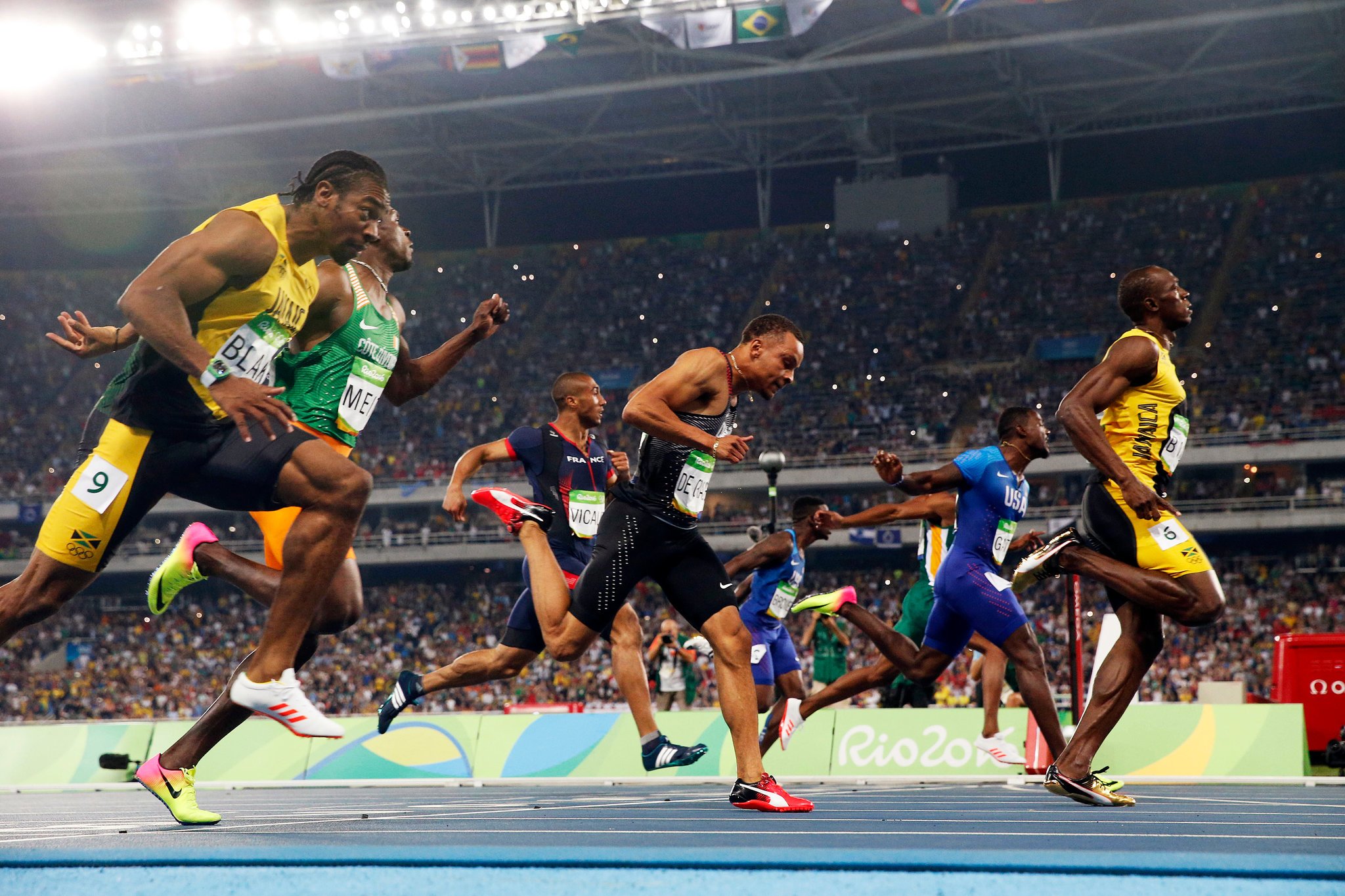

RIO DE JANEIRO — As the king of sprinting and the biggest global star at the Rio Games, Usain Bolt of Jamaica held aloft his index finger, signaling that he was No. 1, during introductions Sunday night as a smitten crowd chanted his name.
Then Bolt proved it again, winning the 100 meters in 9.81 seconds, a coronation that secured his place as the greatest sprinter of all time. He is the only man or woman to win the Olympic 100 three times, which he accomplished at three consecutive Games.
Continue reading the main story

His main rival, Justin Gatlin of the United States, the 2004 Olympic champion who later served a suspension for doping and was booed on Sunday, took the silver medal in 9.89 seconds. Andre De Grasse of Canada won the bronze in 9.91.
Continue reading the main story


As the exuberant Bolt ran down Gatlin in the final 40 meters, he pounded his chest. He then blew kisses to the crowd, hugged some spectators and carried a toy Olympic mascot around the track before giving it away.
Finally, Bolt struck his signature pose, known as To Di World, cocking an elbow and aiming his fingers toward the sky, as if launching an arrow or a lightning bolt.
He is also favored to win a third straight gold medal at 200 meters in Rio and yet another as the most vital member of Jamaica’s 4×100-meter relay team.
Continue reading the main story

“Somebody said I can become immortal,” Bolt said. “Two more medals to go and I can sign off. Immortal.”
Continue reading the main story
Gracious in defeat, Gatlin said of Bolt, “He rises to the occasion, he is a great runner.”
Even an athlete as great as Bolt, though, can be upstaged on rare occasions. That happened Sunday when Wayde van Niekerk of South Africa set a world record in winning the 400 meters in 43.03 seconds, shattering Michael Johnson’s 17-year-old record of 43.18.
Running on the outside in lane 8, where he could not see his competitors, van Niekerk astonishingly shaved more than four-tenths of a second from his previous career best of 43.48 and more than a second from his season’s fastest race before the Olympic final.
“I was running completely blind,” van Niekerk said, stunned. “I was out of my mind. I thought I would lose.”
Fairly or unfairly, given the tainted state of track and field due to doping, that performance may bring as much skepticism as celebration.
Continue reading the main story
Replay: How Usain Bolt Won The 100 Meters
Bolt surged in the last 40 meters to beat Justin Gatlin of the United States.
For Bolt, Sunday’s victory carried both a sense of festivity and farewell. He will turn 30 next Sunday as the Rio Games end. He has said repeatedly that these will be his final Olympics.
He plans to retire next year after the world track and field championships in London, with one transcendent career goal remaining: to take his world record of 19.19 seconds at 200 meters below the 19-second barrier.
The 100 meters “has got to be the most universal event other than the long jump,” said David Wallechinsky, the president of the International Society of Olympic Historians, speaking of Sunday’s victory. “Everyone’s tried it at least once in their lives. To be the best in the Olympics three times in something that everyone has done at least once is incredible.”
When Bolt crossed the line Sunday, it was not with the same astonishment as that night eight years ago at the Beijing Games, when he was new to the public and to the 100 and he finished in 9.69 seconds, easing up and celebrating before the finish but still smashing his own world record.
Nor did Sunday’s performance match the wonder of the 9.58 that Bolt ran a year later to set the current 100 record at the 2009 world track and field championships in Berlin.

As with his victory at the 2012 London Games in 9.63 seconds, winning for Bolt is now more about career achievement, historical standing and dominance in the biggest moments than mere startling speed.
He stacks wins as if they were poker chips. Since he became an otherworldly figure with his performances in 2008, Bolt has won 69 of 74 races. His only truly important defeat came with his elimination on a false start in the 100 at the 2011 world track and field championships in Daegu, South Korea.
“It was brilliant,” Bolt said of Sunday’s race. “I didn’t go so fast but I’m so happy I won. I told you guys I was going to do it.”
Before the Olympics, Bolt had raced little this season. In recent years, he has become vulnerable to nagging injuries in his back that radiate into the muscles of his legs.
He withdrew on July 1 from the final of the 100 at the Jamaican Olympic trials with a slight tear in his left hamstring muscle. But Jamaica’s rules, unlike those of the United States, which require a top-three finish to qualify for the Summer Games, allowed Bolt to be entered in the Rio Games anyway.

Some American sprinters joked at the time that Bolt always seemed to sustain some injury before the Olympics or world championships. Sure, they said, he would be ready for Rio.
“It’s a tradition,” Tyson Gay said.
But sprinting is a lot like boxing in the sense that they are individual and elemental sports, one man against another with his legs or his fists. Sleights, real or perceived, become dramatically exaggerated.
Bolt said he was disappointed by the joking remarks of Gatlin and other Americans, adding: “I think they have not learned over the years that the more you talk, the more I will want to beat you. It’s one of those things, but I’m looking forward to it, should be exciting and they will feel my full wrath as always.”
Continue reading the main story

In the end, the buildup to the Olympic 100 turned out to be more playful than antagonistic. Bolt held a news conference here featuring samba dancers and a Norwegian journalist who broke into a worshipful rap song, saying he hoped that the Jamaican star would again prevail.
Bolt said he was surprised to hear Gatlin booed before Sunday’s final. As he often does, Bolt reacted relatively slowly to the starting gun, slower than every competitor but one. He is 6-feet-5 inches, and it can take his body sometime to unfurl, like a flag.
He also may have grown somewhat cautious after that false start at the 2011 world championships. Once, one false start was permitted. Now, an early lean or even a reaction to the gun in under a tenth of a second, brings automatic disqualification.
But Bolt’s biggest strength is not the first 50 meters. It is the second 50 meters. He is so tall, his legs so long, that he takes only 40 or 41 strides over 100 meters, where other sprinters might need 43 or 44 or even 46.
He also holds his top-end speed better than others. No sprinters speed up at the end of a 100-meter race as it appears they do. That is an optical illusion. The winner is not the person shifting into another gear but the one slowing down the slowest.
Continue reading the main story

At the 2015 world track and field championships in Beijing, Gatlin had Bolt beaten but leaned too early, wobbling with a kind of swimming motion. Bolt caught him at the line, winning by a hundredth of a second.
Again on Sunday, Gatlin got a quicker start, but Bolt chased him down.
“His legacy will depend on what he does with the rest of his life, Wallechinsky, the Olympic historian, said of Bolt. “The best is if he goes around, giving clinics, and travels the world like Muhammad Ali and becomes well known in Africa and Asia and is someone that everybody loves,” he said. “ Or he could just have a good time for the rest of his life.”
[Source: The New yourk times]





